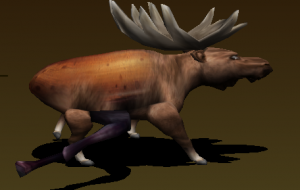question for NT
how does it make you feel or what do u do when u see someone doing repetitive movement like rocking and spinning
and how do u feel when someone accidentally breaks the social rules or social cues
do u get mad at them or do u think they have autism
like how do u feel about it
_________________
diagnosed with autistic disorder.
1) Depends on the context, but I probably would hardly notice or just think "hmm, odd." Even we NTs fidget, although autistic fidgets tend to be different due to the sensory stuff. People do odd stuff all the time. I usually guess it's drunkenness, though there was one case I suspected of schizophrenia. (Some young apparently homeless guy who always seemed to be talking to himself, or someone.)
2) Depends on the social rule or cue. Some of them I don't notice/care about. For others, well, I might get upset, but usually when someone behaves a bit off (for example, being rude to customers, driving badly) I give them the benefit of the doubt - they had a bad day, or they're tired, or they have a bad job, or they're inexperienced. I don't think this is common practice, though...people often only give the benefit of the doubt to themselves or their loved ones. I might suspect they're autistic, or attribute it to their known autism, if their social rule-breaking involves taking things too literally, not responding to body language or facial expressions, or talking incessantly about a single subject.
In short, everything depends on the context for us NTs. It depends on what we expect in that situation, and our relationship to the person, and so on. A parent or close relative of an autist might get more upset about autistic fidgets (stims) because they see it as a sign that their kid/relative "isn't getting better."
2) Depends on the social rule or cue. Some of them I don't notice/care about. For others, well, I might get upset, but usually when someone behaves a bit off (for example, being rude to customers, driving badly) I give them the benefit of the doubt - they had a bad day, or they're tired, or they have a bad job, or they're inexperienced. I don't think this is common practice, though...people often only give the benefit of the doubt to themselves or their loved ones. I might suspect they're autistic, or attribute it to their known autism, if their social rule-breaking involves taking things too literally, not responding to body language or facial expressions, or talking incessantly about a single subject.
In short, everything depends on the context for us NTs. It depends on what we expect in that situation, and our relationship to the person, and so on. A parent or close relative of an autist might get more upset about autistic fidgets (stims) because they see it as a sign that their kid/relative "isn't getting better."
This is off-topic but is your username a reference to "The Yellow Wallpaper" by Charlotte Perkins Gilman?
To answer the OP: I don't believe I am NT (although I could be), though not necessarily autistic either, but I would likely wonder if that person was autistic, knowing what I do about the condition.
and how do u feel when someone accidentally breaks the social rules or social cues
do u get mad at them or do u think they have autism
like how do u feel about it
I sent this to my NT dad and this is what he said.
There aren't that many people who know about autism and how to recognize it. For most people when they see autistic behavior, what crosses their mind is the person has a mental health issue and or is on drugs. And let's face it, there's more druggies than auties out there displaying unusual behavior. I know when most people see my son, wrong thoughts cross their mind. There's times when they look cross, until I simply tell them he has autism, and usually they seem to understand enough to let it go.
No, it's supposed to be about differences in NT vs. autistic perception that I'd read about in Temple Grandin's "Animals in Translation." We NTs often can't see the trees for the forest: we lose the details perceiving a loose, larger pattern. We tend to do poorly on "embedded image" tests as a result. An example from my recent real-life at the time was seeing ghosts in the wallpaper instead of the individual flowers and vines in the intended pattern. But then someone here told me that Kanner autistics often see patterns like that as well.
| Similar Topics | |
|---|---|
| Question |
23 Oct 2024, 4:07 pm |
| Grammar question |
30 Dec 2024, 7:14 pm |
| Question about the Pokemon anime series |
21 Nov 2024, 10:01 pm |
|
Question about my history of depressive experience.
in Bipolar, Tourettes, Schizophrenia, and other Psychological Conditions |
09 Nov 2024, 12:11 am |









